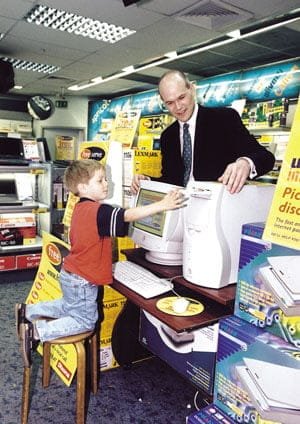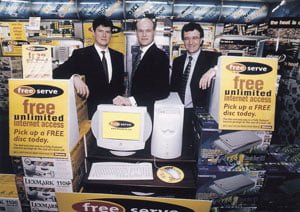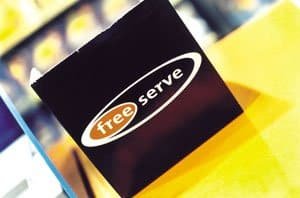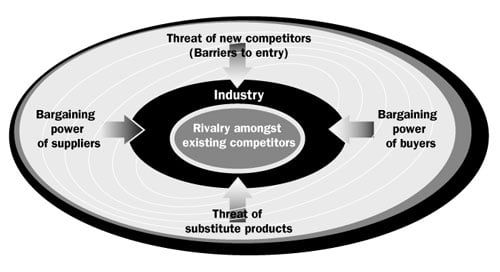
The Internet is a rapidly growing medium which enables people all over the world to share information, communicate, be entertained and conduct business. It is beginning to influence the lives of many people. Research has shown that web users worldwide will grow from approximately 142.2 million at the end of 1998 to 398.6 million by the year 2002.
This case study examines how Freeserve became the UK’s largest Internet service provider after only nine months of operation. In a fiercely competitive market, Freeserve has taken steps to maintain its advantage by becoming a public limited company and analysing its external business environment.
To date Internet usage in the UK has lagged behind the United States for a number of reasons:
- A lower number of UK homes have a Personal Computer – in 1999 only 39 per cent of UK households owned a PC compared to 57 per cent in the US
- The high costs of Internet use in the UK – the monthly cost of Internet access in the UK, based on 20 hours of Internet use plus telephone charges, per month, averaged $46 and $70 for non peak and peak calling times compared to $40 in the US at any time
- Lack of consumer friendliness and insufficient UK content – non-UK companies who lack understanding of UK consumers have created the content and information available on the Internet in the UK.
As a result of its extensive knowledge of UK Personal Computer consumers, Dixons, the UK’s leading electronic retailer, developed Freeserve specifically to meet their needs. Freeserve was launched on 22nd September 1998 as part of the Dixons Group.
Changing the market

Freeserve combines free Internet access and comprehensive Internet resources, which are tailored to the UK market. On 26th June, 1999, after only nine months of operation, Freeserve had the largest registered Internet user base, making it the UK’s leading Internet service. Delivering free Internet access, offering UK focused content, e-commerce and extensive support services, Freeserve attributes its rapid growth to the strength of its customer support extensive marketing abilities and cost effective distribution capabilities through the Dixons Group.
By initiating free Internet access on a mass-market basis, Freeserve has contributed significantly to the growth of Internet usage in the UK due to:
- an increase in home PC penetration
- increased consumer awareness of the world wide web
- increased availability of UK focused content and commerce on the web
- decreasing costs of Internet usage due to lower access and telecommunications costs.
As the UK’s market leader, Freeserve currently offers:
- a free and simple Internet connection, without a connection fee and including e-mail, personal web
- space and online customer support
- a variety of Internet tools and services, including search, instant messaging, chat and domain name registration
- a comprehensive selection of UK content, including news, information and channels covering areas such as sport, education, travel, entertainment, money and technology
- a wide selection of UK focussed e-commerce offerings.
Freeserve has become the leading Internet brand in the UK, built on the largest active user base in the country, achieving twice the market share of its nearest rival. The success of Freeserve has not only contributed to the growth of the UK Internet market, but has also increased competition within the industry.
Maintaining competitive advantage

Any market which is experiencing rapid growth is likely to be very competitive. For a business to operate in a competitive market, it needs resources. Whether these are physical resources such as property, equipment and materials, or less tangible human resources, finance is required to pay for their use. Therefore, the management of finance is inseparable from the management of the business as a whole.
Businesses generally use a number of financial sources, such as:
- individuals – founders, employees
- organisations that specialise in venture capital for businesses
- banks and other financial institutions
- suppliers
- the government
- profits retained in the business.
Investors of any category do not make investments with the same expectations. The type of investment they make reflects their interests. For example, investors who only wish to tie up their money for a finite period of time may invest in an incorporated business, whose ability to trade remains unaffected by any changes in ownership. Shareholders receive benefits from the profits earned in the form of cash dividends and an increase in the value of their shares.
Incorporated businesses are those legal identities, quite separate from their owners. The capital contributed by the owners of the business is divided into shares. Hence an owner is called a shareholder. Shareholders have limited liability, as the maximum amount that they can lose is the amount that they paid for the shares, rather than their personal wealth if the firm should become insolvent.
Though Freeserve was established within the Dixons Group plc, the strategy for the business has been to give Freeserve its independence. Its launch on the stock exchange means Freeserve can obtain finance independently and provide opportunities for its shareholders. On August 2, 1999, Freeserve became the first Internet brand in the UK to obtain a listing on the London Stock Exchange, Techmark and NASDAQ.
Floating Freeserve
The London Stock Exchange is a market for securities, the collective name for stocks and shares. The main function of the stock market is to enable firms to raise capital and to provide a market for trading in second hand shares and government stocks.
NASDAQ is part of the American Stock exchange and is the world’s first electronic trading environment. It allows multiple market participants to trade a company’s stock through a sophisticated computer and telecommunications network making it a truly global market. The public shares offering of Freeserve raised net proceeds of over £122.9 million.
The Dixons Group retained 80% of Freeserve’s shares. The flotation of Freeserve has provided it with the capital to develop its range of content and services while maintaining its relationship with the Dixons Group. This has placed Freeserve in a strong position to be able to respond to changes and maintain its competitive edge.
Flotation is the name given to the launch of a company onto the stock market by the offer of its shares to the public. Plcs that obtain a listing on the stock exchange gain a number of advantages:
- access to a large potential source of capital
- enhanced reputation for the company
- increased employee satisfaction via share option schemes
- easier buying and selling of shares, which increases their value.
Competition across the industry

When looking at an organisation’s competitive position, it is important to understand the opportunities which exist in the market, as well as other competitive threats. The ideal situation would be a large market with growth potential and little competition. However, the Internet market has shown considerable growth in recent years and is also fiercely competitive. The market for subscribers, users and Internet advertising is new and rapidly evolving. Competition is expected to increase in the future.
Michael Porter has argued that there are five forces determining both the nature of competition an industry will have to face and the profitability of the entire industry. Four external competitive forces can influence the existing competition within an industry.
Bargaining power of buyers
Since the launch of Freeserve, over 100 other companies have introduced free Internet access services in the UK and some existing online services have stopped charging access fees. Consequently, there are low switching costs for users and subscribers.
Bargaining power of suppliers
Freeserve’s business and growth depends, in part, on the capacity, reliability and security of its network infrastructure, which is provided by Planet Online. In addition, Freeserve depends on public telecommunications operators such as British Telecom to transmit its traffic over long distance networks.
Due to the increased use of the Internet, telecommunications operators have experienced capacity problems. If Freeserve’s growth exceeded the current network capacity, Freeserve would have to acquire capacity on less favourable terms or with inferior service levels. Freeserve receives a pre-determined connection fee each time one of its users connects to the Internet.
Connectivity is a major source of revenue for Freeserve. If the costs of connectivity were significantly reduced, Freeserve would lose a significant proportion of its revenue. For this reason, Freeserve is looking to reduce its dependency on connection fee income over time.
The threat of substitute products
Freeserve competes for advertisers and advertising revenue with traditional forms of media, such as newspapers, magazines, radio and television.
Barriers to entry
Although barriers to entry in the Internet market are low compared to traditional markets, Freeserve has a number of unique advantages to help it counter the threat of new competitors. Barriers to entry include:
- Economies of scale – Freeserve’s relationship with the Dixons Group provides it with several important benefits. Dixons’ credibility and long relationships with its suppliers strengthen Freeserve’s position in negotiating its own agreements. Freeserve also has access to Dixons Group’s operational skills, systems and infrastructure. Freeserve is a leading brand with approximately 1.4 million active users. Its large user base and strong brand name enhance its ability to enter into favourable arrangements with network service providers, e-commerce partners, online advertisers and content providers.
- Product differentiation – Freeserve differentiates itself from most of its competitors by not being a pure provider of Internet access or a customer loyalty programme for Dixons Group.
- Capital requirements – Freeserve’s recent flotation gave it powerful acquisition currency. Freeserve invested in Telepost, a provider of low cost teleconferencing and telecommunications. It acquired 100 per cent of Babyworld, an Internet business targeting families that are planning, expecting or have recently had a baby and recently acquired an 80 per cent share in a UK focussed auction business.
- Switching costs – Switching costs are incurred when changing the use of resources to develop products for a different market. Freeserve has the capital following its flotation to meet such switching costs involved in product development.
- Access to distribution channels – Freeserve benefits from extensive UK distribution channels through Dixons, Currys, The Link, PC World and @jakarta.
- Cost disadvantages – The flotation of Freeserve incurred charges of some £3.6 million flotation fees, expenses and marketing costs of £12 million. However, the costs were significantly outweighed by the benefits to Freeserve.
Conclusion
Freeserve’s revenue depends on the size of its registered user base, user traffic levels, advertising and e-commerce activity on its sites. To sustain its position in the Internet market, Freeserve has recognised the need to gather and respond to user feedback, continue to develop UK focussed content and services and maintain its low cost.
As the UK Internet market grows, Freeserve must be ready not only to live in UK homes but also live with its competition. Freeserve’s vision is to harness the power of the Internet for the whole community, giving people the tools and services that enable them to enrich their lives.
